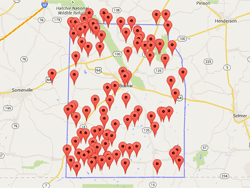In order that justice may be done the people who live along the banks of Hatchie river, as well as to our fellow citizens, we call attention to the fact that the General Assembly of the State in 1865, passed an act declaring the river a nuisance from the point where the Memphis and Ohio railroad bridge spans the same, eastward. This action of the Legislature never had the sanction of those who were mostly interested but it is a notorious fact that the bill was engineered through the Legislature by a few who, doubtless, were in the paid service of the railroad in question. Hatchie river from Bolivar to its mouth, is no nuisance; every old citizen knows this to be the plain, unvarnished truth. To our own personal knowledge, steamboats of moderate size, as large as those that navigate the Yazoo, could have made regular trips to Bolivar fully seven months of the year 1867; even now there is eight or ten feet of water from here to the Mississippi. With such facts before us, we would not be doing our duty were we not to call the attention of our representative in the Legislature to the great wrong practiced upon the people of Hardeman, Madison, Haywood and Tipton counties by the act that unjustly declares the Hatchie river a nuisance eastward of the Brownsville bridge. We do not make war upon the railroad, buy only seek the reopening of the Hatchie river, and earnestly request W. M. JOHNSON, in behalf of our people to loose no time in bringing the question before the body of which he is a member. While in Memphis, a few days ago, an old steamboat-man told us that if Hatchie river was opened he would be a boat in the trade and carry cotton from here to Memphis for $1 per bale and in return, deliver freight at Bolivar for fifty cents per hundred. Let the river be opened – competition is the life of trade.
The Bolivar Bulletin. (Bolivar, Hardeman County, Tenn.), 11 Jan. 1868, Page 2. Chronicling America: Historic American Newspapers. Lib. of Congress.




